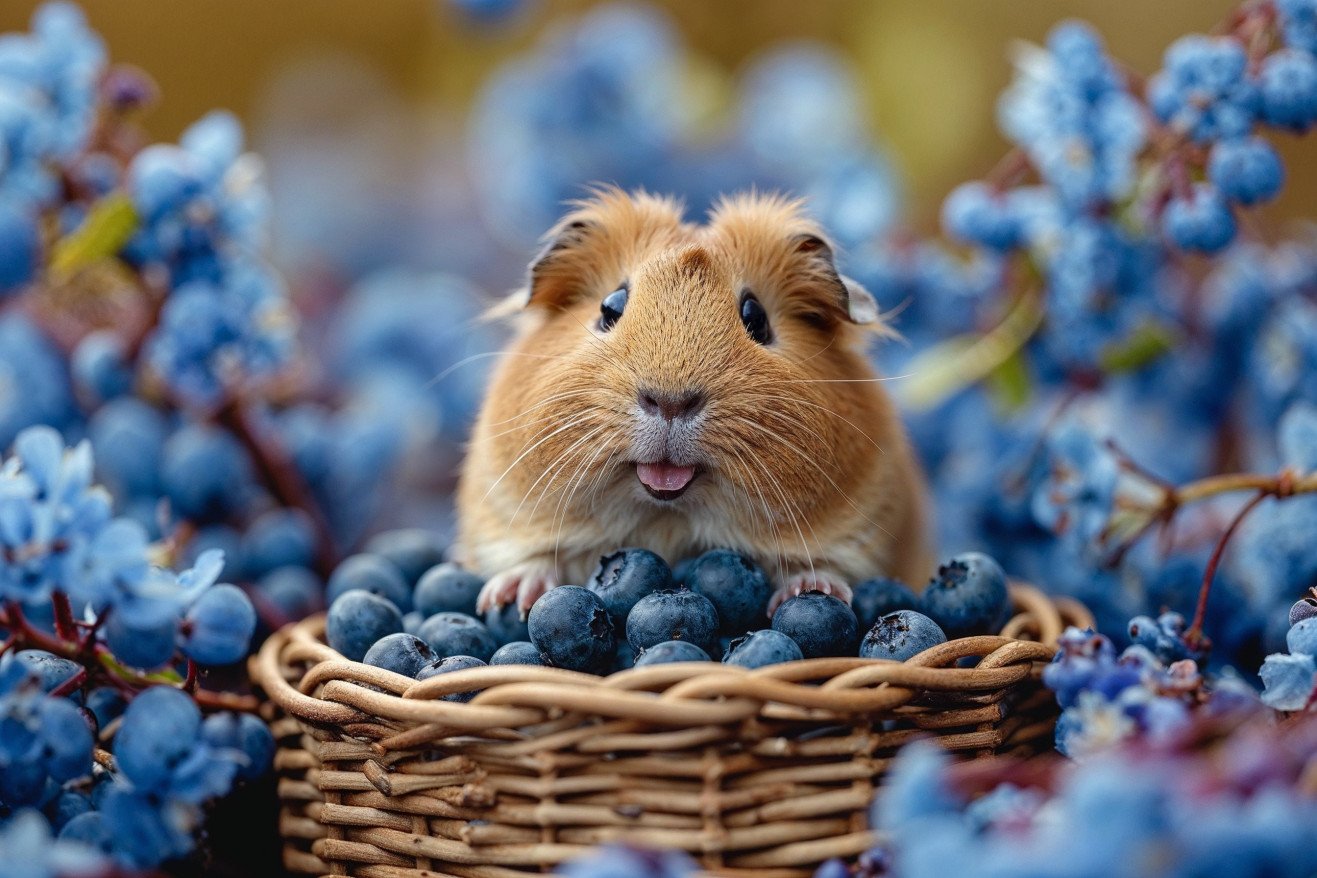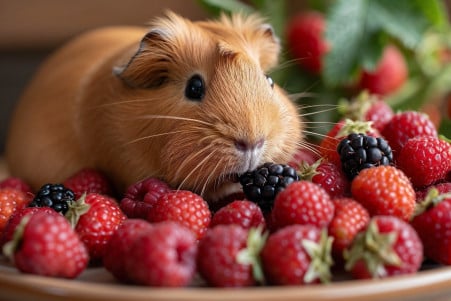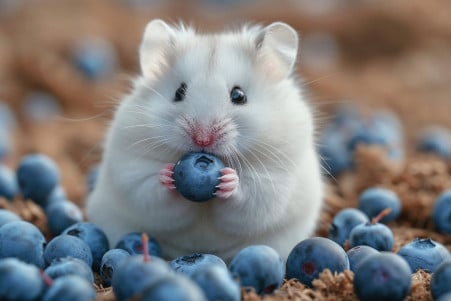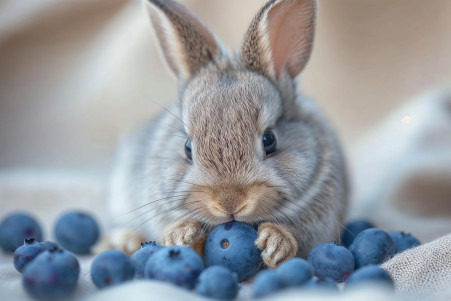Can Guinea Pigs Eat Blueberries? A Guide to Safe Snacking
23 January 2024 • Updated 28 January 2024

Blueberries are a delicious and nutritious fruit for humans, but can guinea pigs eat them too? Guinea pigs can eat blueberries, but they should be considered a treat. Because of their sugar content, you should only give your guinea pig blueberries once or twice a week, and when you do, make sure to give them no more than a small portion, such as 1 tablespoon.
Also, make sure to wash blueberries well to remove any pesticides before giving them to your guinea pig.
We will cover nutritional studies, information from veterinarians, and other animal care research to give you a complete picture of guinea pig nutrition. This will include the place of fruits like blueberries in a guinea pig’s diet and the care that should be taken when adding new foods to their menu. You’ll learn how to make sure treats don’t interfere with the nutrients guinea pigs need to stay healthy and happy.
Can guinea pigs eat blueberries?
Nutritional Value of Blueberries and How They Affect Guinea Pig Health
Blueberries are packed with essential nutrients, including a variety of vitamins and minerals that are important for overall health. According to Blueberry.org, blueberries are a good source of dietary fiber, vitamin C, manganese, and vitamin K1, and they are low in calories. Healthline also says that blueberries are a good source of vitamin C, vitamin K1, and manganese, all of which are important for bone health and the immune system.
Blueberries are also known for their antioxidants, and the anthocyanins in blueberries are especially important. A study by Onur Tolga Okan and colleagues that was published in Not Bot Horti Agrobo shows that blueberries have a high antioxidant capacity, which helps fight oxidative stress.
On the other hand, Healthline warns that the sugar in blueberries can be a problem for guinea pigs if they eat too many of them. This can lead to obesity and other health problems in guinea pigs.
So, while the nutrients in blueberries can be good for guinea pigs, they can also be harmful if they aren’t given in moderation. This means that it’s important to make sure that guinea pigs’ diets meet their nutritional needs while also making sure that they don’t eat too many treats like blueberries.
How to Feed Your Guinea Pig a Healthy Diet
Guinea pigs need a diet that includes lots of hay, fresh vegetables, and vitamin C, which they can’t make in their bodies or store for later use. The RSPCA recommends feeding guinea pigs fresh, leafy greens or weeds that have been washed and high-quality hay to help with digestion and dental care. The Humane Society of the United States notes that guinea pigs need vitamin C to avoid health problems like scurvy.
While guinea pigs can eat fruit, it’s important to be careful because of the sugar content. Too much sugar can lead to obesity and other health problems. As a result, blueberries and other fruits should be fed to guinea pigs in moderation and not be a regular part of their diet.
When you do feed your guinea pig blueberries, make sure to introduce them slowly to avoid upsetting your pet’s digestive system. The Humane Society recommends introducing new foods to your guinea pig’s diet slowly to make sure they don’t have any negative reactions. This way, you can make sure your guinea pig gets the benefits of blueberries without any problems, helping them maintain a well-rounded diet that will help them stay happy and healthy.
The Bottom Line: The Role of Fruit in the Diet of Small Mammals
Fruits are an important source of dietary fiber, vitamins, and phytochemicals with antioxidant properties for small mammals, according to a study published on PMC. These nutrients help to promote digestive health and reduce the risk of chronic diseases, which in turn helps to promote the health and well-being of small mammals.
For example, dietary fiber is important for maintaining healthy gut bacteria, and vitamins, such as those found in blueberries, are important for maintaining a healthy immune system.
At the same time, there are potential downsides to fruit consumption, especially when it comes to the sugar that fruits contain. A study published on PMC even discusses the paradoxical relationship between fruit and obesity, explaining that while fruit has anti-obesity effects in humans, the sugar in fruit can lead to obesity when it’s consumed in large amounts.
This is particularly important for guinea pigs, who are prone to obesity and its associated health problems when they consume high-sugar diets because of their small size.
In the case of guinea pigs, these general principles suggest that moderation is key, especially when it comes to foods like blueberries. Feeding guinea pigs blueberries as an occasional snack rather than a regular part of their diet can help ensure that they get the benefits of the fruit without the downsides.
This is the best way to make sure that blueberries and other fruits are part of a guinea pig’s diet in a way that supports their health without causing unintended harm.
A Berry Good Idea: How to Add Blueberries to Your Guinea Pig’s Diet
If you want to add blueberries to your guinea pig’s diet, you can do so safely and responsibly. First, make sure to wash the blueberries thoroughly to remove any pesticides, or buy organic blueberries, as Hepper suggests. Then, make sure to introduce blueberries slowly to see how your guinea pig reacts and to avoid any tummy troubles.
Guinea Pig Academy suggests a serving size of about 1 tablespoon of blueberries, which you can give to your guinea pig once or twice a week. This way, you can make sure that your guinea pig isn’t getting too much sugar, which can throw off their gut flora and lead to other health problems.
Make sure to monitor your pet for any changes when you introduce new foods and talk to an exotic vet if you notice anything concerning.
If you’re worried about the sugar in blueberries, you can also try low-sugar options like cucumbers or bell peppers, which are also high in vitamin C. Just remember that treats like blueberries should be part of a diet that’s made up mostly of hay, fortified pellets, and fresh veggies. If you stick to these rules, you can give your guinea pig blueberries as a healthy and fun treat.
The Bottom Line: The Berry Basics of Guinea Pig Nutrition
In this article, we’ve delved into whether guinea pigs can eat blueberries. Drawing on the expertise of Hepper and Guinea Pig Academy, we’ve learned that guinea pigs can eat blueberries and that they can benefit from the nutrients that blueberries provide. Blueberries are high in antioxidants and are a good source of vitamins C and K, all of which can be good for guinea pigs when consumed in moderation.
That said, it’s important to remember that blueberries should be part of a well-rounded diet that includes hay, fresh vegetables, and vitamin C–fortified pellets.
While blueberries can be good for guinea pigs, they should be fed to them in moderation to avoid giving them too much sugar and upsetting their stomachs. In general, it’s best to feed guinea pigs about a tablespoon of blueberries once or twice a week to ensure that they get the benefits of variety without the risks of overconsumption.
In conclusion, it’s important to work with a vet to determine the best diet for your guinea pig, including the role that treats like blueberries can play in their diet. When used appropriately, treats like blueberries can make a guinea pig’s diet more enjoyable and improve their quality of life. So let’s make sure we’re being good pet parents by feeding our guinea pigs these small but powerful fruits in the right way.


